In the reality of mobile app development, Artificial Intelligence emerges as a game-changing technology. It has completely revolutionized the process of creating, testing, and optimizing mobile apps for effective development and better user experience.
The article presents the 10 best AI tools for mobile app development across the market now, being effectively used. These AI tools enable developers to make their workflow creative for developing smarter, more intuitive applications.
Let’s find out tools you can use to boost your mobile apps to new levels!
How Do AI Tools Help in Mobile App Development?
AI-driven mobile app development tools are artificial intelligence and machine learning-driven software solutions that aid developers in building various aspects of an app. These tools can help in code generation, UI design, testing, performance optimization, and even predicting user behavior.
By integrating AI into the development workflow, developers can use their time more efficiently, make fewer mistakes, and adjust to user requirements with increasingly complex applications.
Why use AI tools for Mobile App Development
With the dynamically saturated mobile app development landscape, developers are seeking to create mobile apps that prestigiously flounce their standing among the competition through AI tools. Here are some dynamic reasons that make it compulsory to include AI tools in mobile app development:
1. Improved User Experience
AI features will be able to analyze users’ behaviors, preferences, and interactions to create more personalized and intuitive user experiences. Thanks to machine learning algorithms, single users could benefit from apps that have learned user preferences and can therefore propose content, recommendations, and interfaces that users agree with, making user engagement and satisfaction much higher.
2. Higher Efficiency
AI tools for app development can automate lots of time-consuming tasks, such as code generation, testing, and debugging activities. The automation enables developers to change their focus toward more creative and strategic lines in the development of apps and therefore quickens the development process, reducing time to market.
3. Advanced Functionality
It is now that AI enables mobile applications to be designed with features like natural language processing, computer vision, and predictive analytics. These additions would significantly beef up the performance to the extent that a single app would be made highly functional and useful to the end user.
4. Better and Effective Decision Making
AI tools will deliver insights based on user data and an app’s performance metrics. It allows developers and a business to make data-driven decisions about how to prioritize features, improve the UI, and other parts of the app’s strategy.
5. Predictive Maintenance
AI can help in identifying the issues or bugs before they turn out to be big problems. Using the data analytics of the performance of the apps and the feedback from users, AI tools can easily flag the areas that are in dire need of attention. So, developers can resolve the issues in apps and app quality is maintained.
Suggested Read: 10 Best AI Tools for Game Developers
How to Select a Good AI Tool for Mobile App Development
Several key factors have to be taken into consideration while evaluating AI tools, but a few of them would include the following:
1. Compatibility and Integration
Irrespective of the nature of the task around which the AI has been built, the tool being used should be compatible with your current stack. Also, consider robust APIs and SDKs that would make it easily integrated into the workflow.
2. Scalability
Look for a tool that will grow along with the app. Gauge how the AI solution copes with incremental data volumes and user loads that increase as your app scales.
3. Performance
Determine how well the tool performs for speed, accuracy, and resource consumption. For a mobile app, it would be of high importance to find the best free AI app builders to optimize for on-device processing in the quest for performance and at the same time protect user privacy.
4. Customization Options
Look for AI tools that can offer some flexibility for customization. Fine-tuning models, or the availability of tailor-made AI solutions, could be valuable for unique requirements or special cases for the app.
5. Learning Curve and Documentation
Consider the learning curve associated with the tool and the quality of its documentation. A well-documented AI tool with good community support might make the implementation process significantly easier.
6. Cost Structure
The next check is the tool’s monetization scheme. There are upfront costs, but there can also be long-term expenses, from the cost of scaling here. There is a class of tools with free trial periods, free tiers, and most importantly, pay-as-you-go, for instance for a start-up or small project.
Suggested Read: Top 10 AI Tools for UI/UX Designers
10 Best AI Tools for Mobile App Development
1. ChatGPT
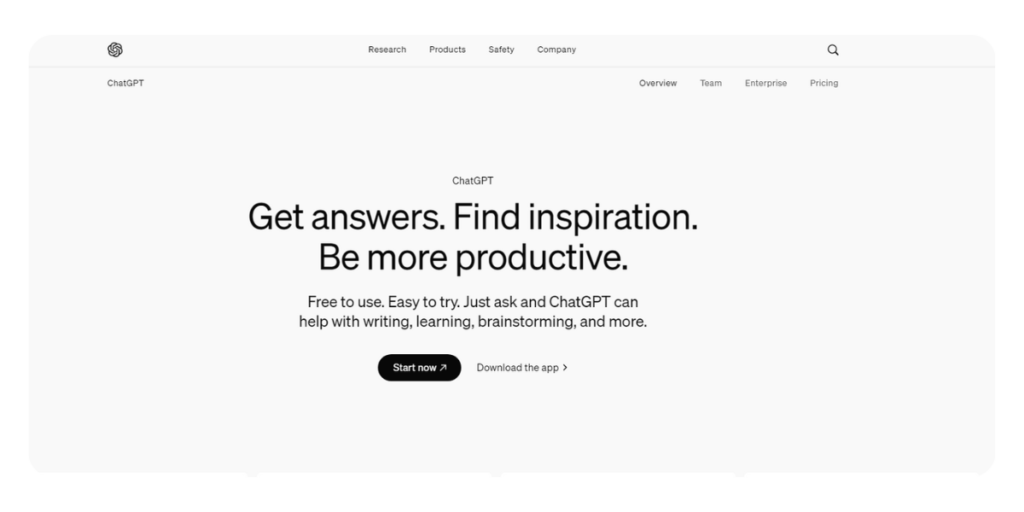
ChatGPT is a sophisticated language model from OpenAI that conquered the tech world. It turned out to be way more useful in this regard; though not designed for developing mobile apps at first, it will turn into a perfect support not only for a developer in generating code pieces and explaining very complicated programming concepts but also for doing troubleshooting work.
The ability of this language model to process natural language makes it an excellent companion during the whole process of app development.
Key Features:
- Natural language code generation
- Debugging assistance
- Description of tricky programming concepts
- Ideation and brainstorming support
Pros:
- Versatile and could be used with most programming languages
- Continuously gets better as updates come out regularly
- Could help accelerate development time
Cons:
- Some computer-generated code requires checking over
- Some responses can be deprecated/wrong
- Lack of context in more extended conversations
Site: https://openai.com/chatgpt
2. CoreML
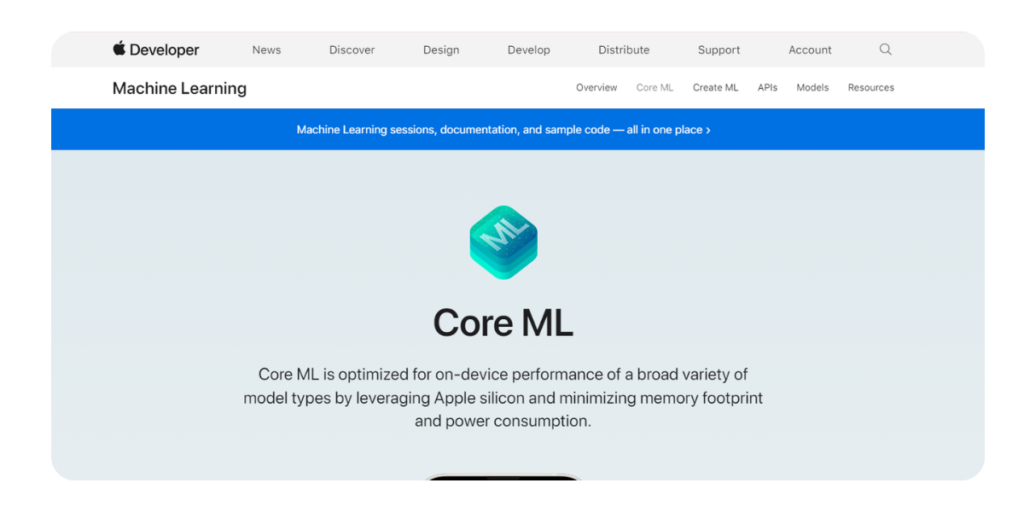
CoreML is the best free AI app builder. It is the machine learning framework Apple provides exclusively for app development in iOS. It gives a chance for a developer to add pre-trained models of machine learning in his app to activate image recognition, natural language processing, and predictive modeling. CoreML is efficient and runs natively on devices.
Hence it will be fast, and the privacy of the user’s data is guaranteed. But that’s not all; it can also provide extensive support for model type, including models trained in popular frameworks such as TensorFlow and sci-kit-learn.
Key Features:
- Device Machine learning processing
- Support for vision and natural language processing
- Easy integration with iOS dev tools
- Model conversion from another framework
Pros:
- Optimized for Apple devices thus gives high performance
- Ensuring the privacy of the users by processing on the device itself
- Combines easily and seamlessly with other Apple frameworks
Cons:
- It is limited only to the iOS platform
- Requires knowledge of the Swift language
- May have complications in the case of large or complex models
Website: https://developer.apple.com/machine-learning/core-ml/
3. GitHub Copilot
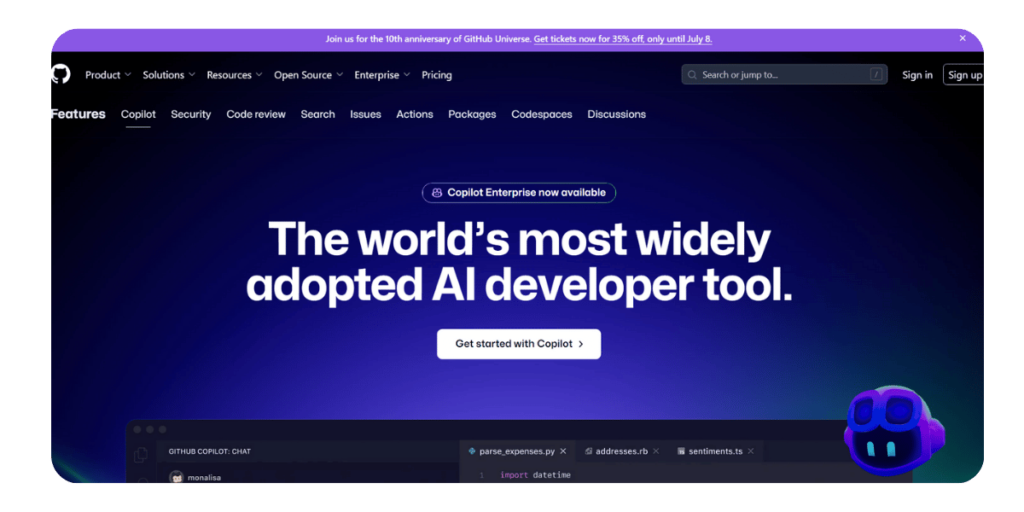
GitHub Copilot is a GitHub-developed AI-powered code completion tool in collaboration with OpenAI. It suggests, using machine learning, the next line of code or even the whole function depending on the context.
Not exclusively mobile development-oriented, Copilot has already drawn attention among the app developers’ community due to the way it accelerates coding and reduces boilerplate tasks.
It also supports almost all programming languages normally used for mobile app development, hence becoming a versatile tool for Android developers and iOS developers alike.
Key Features:
- AI-powered code suggestions
- Context-aware code completion
- Multi-language support
- Integration with the majority of popular integrated development environments
Pros:
- To a great extent, it increases the speed of coding.
- It decreases the monotony of coding.
- It learns your style of coding over some time.
Cons:
- It may suggest codes, which might not be optimized or secure.
- A developer needs to correctly review the suggested codes.
- Subscription-based pricing model
Website: https://github.com/features/copilot
4. Mintlify
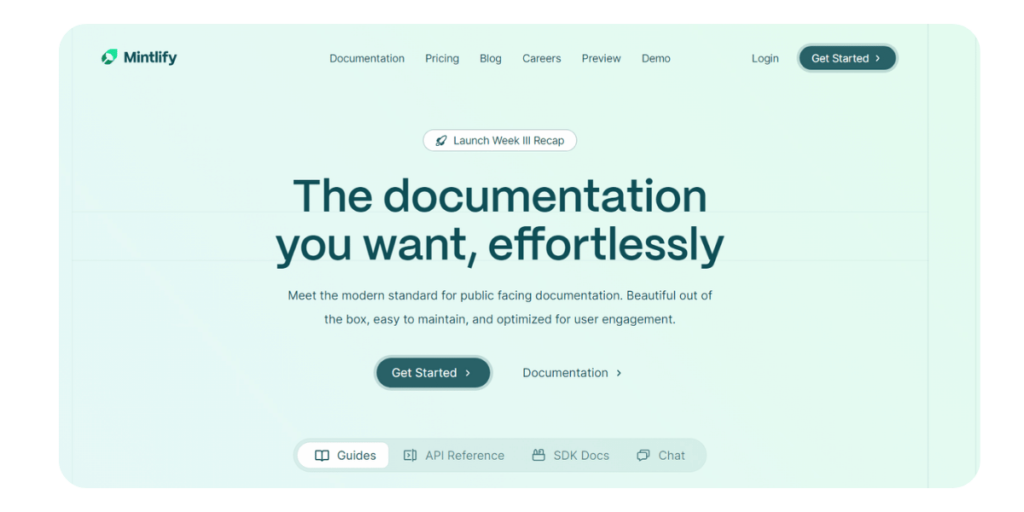
Mintlify is AI-driven documentation to help mobile developers write high-quality documentation. Mintlify is driven by NLP algorithms. Based on analysis of your code base, it autonomously generates Documentation. This can maintain your document in correspondence with evolution because your code changes at a very fast speed.
Therefore, saving much time by using Mintlify will ensure your app document is always up to date and stays accurate. Not strictly a dev tool, but enhances the dev process, smoothing all the pains associated with documentation tasks.
Key features:
- Auto-generation of Docs
- Real-time Syncing against code changes
- AI-powered Content Suggestions
- Customizable Templates and Themes
Pros:
- Time-saving from documentation tasks
- Keeping the documentation updated
- Improves quality and collaborative efforts of the team in the project
Cons:
- Manual review may still be needed for specific complex code logic.
- The support for a few programming languages is weak.
- AI suggestions do not always capture the subtleties of a project.
Website: https://mintlify.com
5. ML Kit
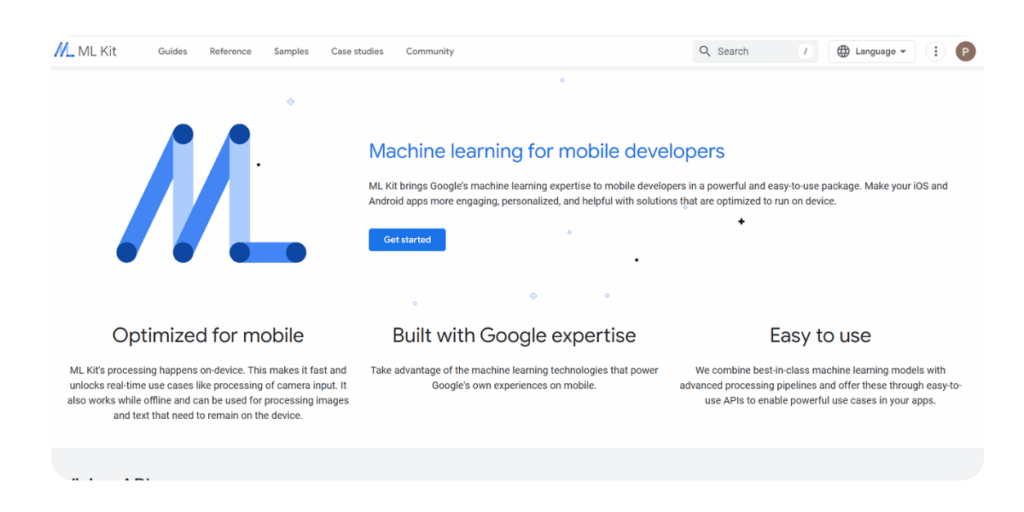
ML Kit is a Google library. In other words, it is the Mobile SDK for machine learning developers. It opens a set of out-of-the-box APIs along with common AI tasks such as text recognition, face detection, image labeling, and barcode scanning.
In contrast, ML Kit exposes on-device and cloud-based APIs; developers can drive their functionality against these at their jointly held discretion. That makes it easy to implement, even by a relatively inexperienced developer in machine learning, and great for putting AI into Android and iOS apps.
Key Features:
- Pre-built APIs: For common ML tasks
- On-device and cloud-based processing options
- Cross-platform support, Android and iOS
- Easy integration with existing mobile development workflows
Pros:
- Make it easier to implement ML features in mobile apps,
- Flexibility with on-device and cloud options,
- Regularly receive new features and improvements.
Cons:
- Fewer configuration options in comparison with full-fledged ML frameworks.
- Some more advanced functionality requires processing in the cloud.
- Dependency on Google services.
Website: https://developers.google.com/ml-kit
6. OpenCV
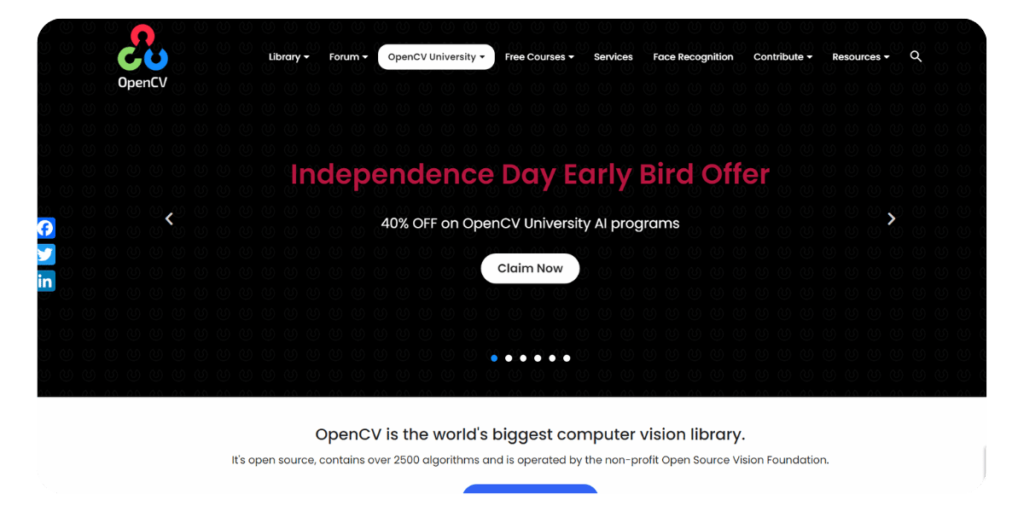
OpenCV or the Open Source Computer Vision Library is a very advanced library that specializes in computer vision and machine learning. Although not developed entirely with the idea of mobile development in mind, it has been growing extremely popular with the idea of providing mobile apps with advanced image and video processing features.
It has a huge number of functions that OpenCV offers in terms of object detection, face recognition, image filtering, and others, due to which it is an extremely versatile tool for mobile developers targeting both Android and iOS platforms to build apps needing complex visual processing.
Key Features:
- Comprehensive Set Of Computer Vision Algorithms
- Cross-Platform
- Faster because of GPU accelerations
- Easy integration with other famous ML frameworks.
Pros:
- Extensive Documentation and Community Support.
- High performance for real-time processing
- Can be used with most programming languages
Cons:
- The steep Learning curve for a beginner
- Resource heavy on mobiles
- Require separate optimizations for mobile
Website: https://opencv.org
7. PyTorch
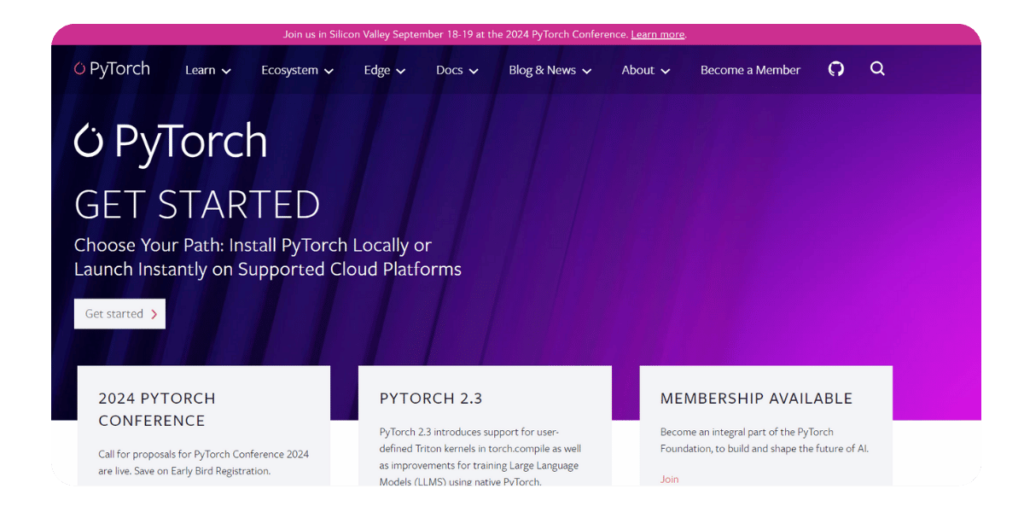
Description: PyTorch is an open source Machine learning library developed by Facebook AI Research lab. Although it was more in use in research and desktop applications due to the introduction of PyTorch Mobile, its adaptation in mobile development has increased.
It’s the framework allowing a developer to train models on PyTorch and run them on mobile devices. It gives flexibility due to the dynamic computation graph on top of which PyTorch was built.
Currently, it seems to be one of the most popular solutions among researchers and developers who have cool AI functionality for mobile apps.
Key Features:
- Dynamic computation graphs
- Python and C++ frontends
- Optimized performance on mobile
- Big repository of pre-trained models
Pros:
- Flexibility in designing and training models
- Actively developing community
- Smooth transition from research to production
Cons:
- More complex than some of the alternatives available
- Additional efforts for mobile optimization
- Smaller mobile ecosystem compared to TensorFlow
Website: https://pytorch.org
8. TensorFlow
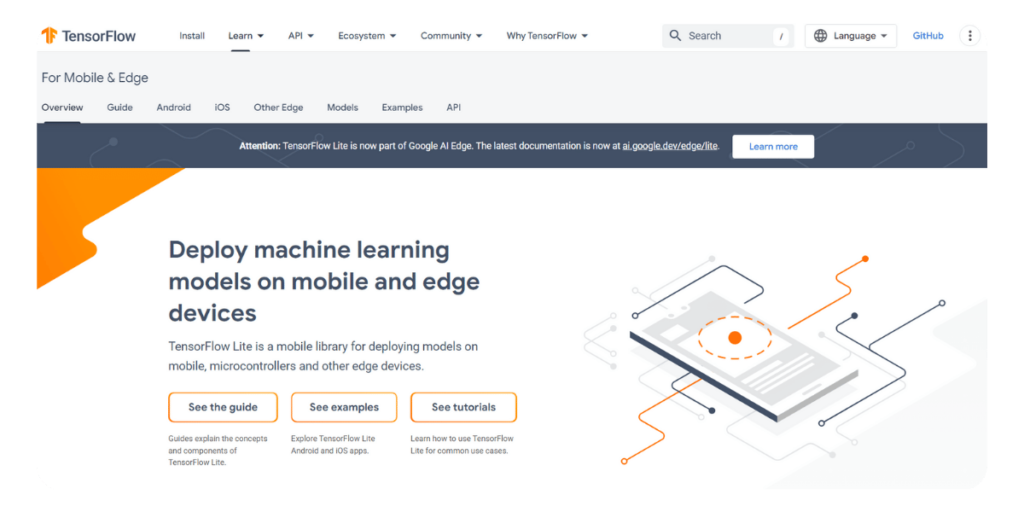
TensorFlow is an open-source free AI tool for app development from Google. In the line of mobile development, there is TensorFlow Lite, a lightweight edition targeted at mobile and embedded devices that are optimized.
Hence, with TensorFlow Lite, one can efficiently execute machine learning models on Android and iOS, which enables high performance with a small binary size.
It supports many tasks in the field of AI, from computer vision to natural language, thus making it versatile while adding AI capabilities to mobile apps.
Key Features:
- Lightweight and optimized for Mobile and Embedded Devices
- On-device Machine Learning support
- Tools To optimize models
- Integrates with Development Environments like Android, iOS
Pros:
- High performance on Mobile
- Huge Ecosystem and Community Support
- A good set of Tools to do model optimization
Cons:
- The steep learning curve for a few users
- Advanced features may require Cloud Support
- Inefficient model conversion process
Website: https://www.tensorflow.org/lite
9. Uizard
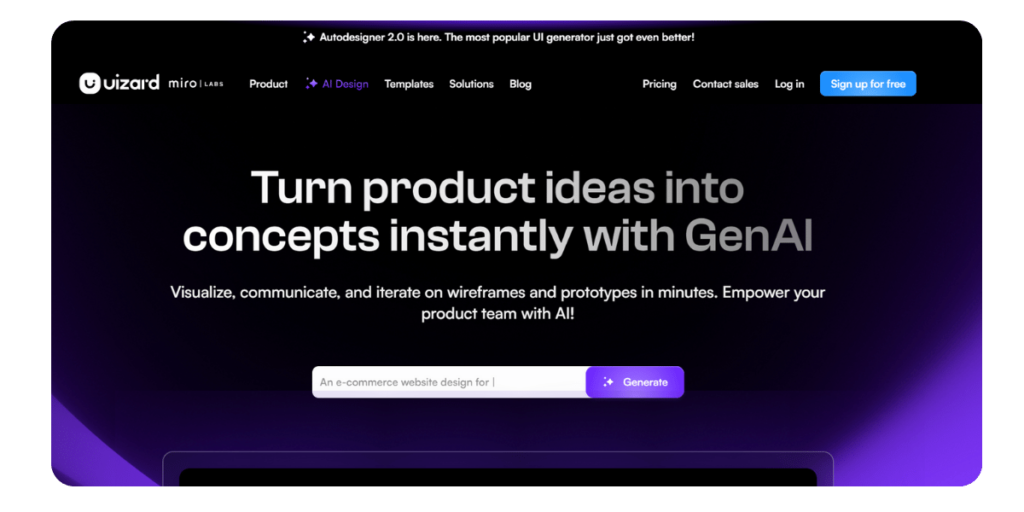
Uizard is an AI-driven design tool which indeed can speed up the process of UI/UX design in mobile app development. Equipped with machine learning algorithms, this tool has the potential to turn only sketches or wireframes into the Wolfe app design. This means that Uizard will come up with design components and color schemes but probably also responsive layouts.
Pros:
- As a non-coding tool, it is invaluable in facilitating the rapid prototyping of the app
- interfaces in the very early stages of mobile app development.
- Allows for rapid prototyping and iteration
Cons:
- Generalized designs with very little room for personalization can often end up being the result
- Less control over the fine details of design
- Professional UI/UX designing cannot be done away with in high-end applications
Website: https://uizard.io
10. Visily
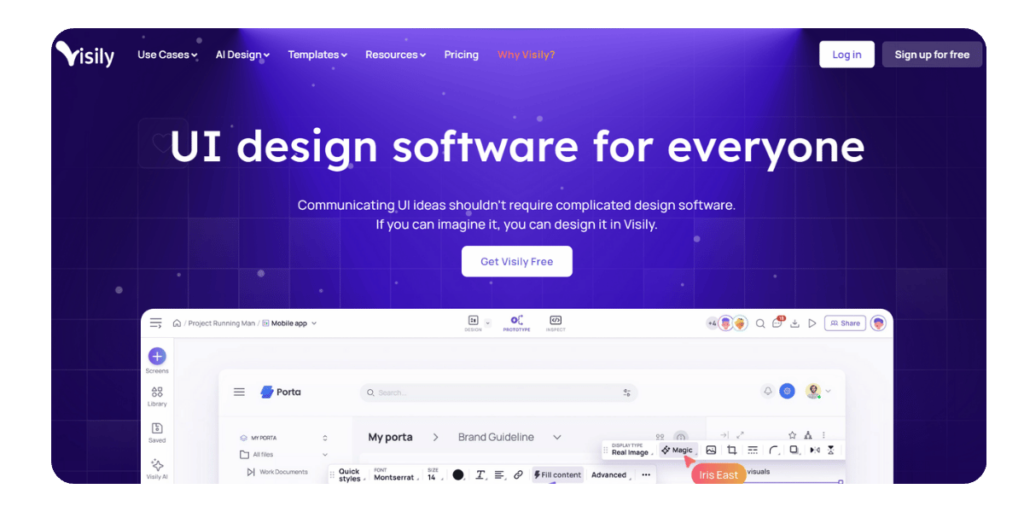
Vasily is another AI tool for Mobile App Development that uses artificial intelligence to undertake the transformation of ideas into functional app prototypes. It learns design patterns and user interfaces through machine learning. Vasily offers developers and designers instant interactive prototyping functionality.
This tool will be enabled to generate several design elements, layout offerings, and even simple animation. Majorly glued to being a design tool, its ability to prototype ideas fast makes it a very crucial tool during the beginning stages of the development process of mobile apps. This brings clear views of concepts and helps in collecting feedback before the initiation of coding.
Key Features:
- AI-assisted interface design
- Interactive prototyping facilities
- Design component suggestions
- Collaboration and sharing facilities
Pros:
- A lot faster in prototyping
- Fill in the gap between idea and implementation
- Especially useful to every designer or to those who are not designers at all
Cons:
- Not many facilities to code or develop
- If not customized it will create partially generic designs
- It’s not an alternative to fully-fledged development tools
Website: https://www.visily.ai
Conclusion
These AI tools for Mobile App Development vary greatly in terms of the AI functionalities they provide and strategies they take to be accessible in app development for mobile applications. The developer is left with these choices given their project needs, technical ability, and targeted platforms—from lower-level frameworks and up to no-code platforms.
FAQs
What are some best tools of AI for mobile app development?
A few that are being used very commonly these days are TensorFlow Lite, Core ML, Fritz AI, and Dialogflow.
Is there some way to assist in app testing while using AI tools?
Sure. Some of these tools are, for example, Applitools and Test.ai, which use AI to perform automated visual testing and detect possible bugs.
Is there any AI tool for improving user experience on the apps?
Definitely, like Lobe and Alteryx, many other tools are there to personalize user experiences and the analysis of user behaviors.
How can AI aid in mobile app design?
AI design tools, such as Sketch2Code and Uizard, actually translate between sketches or wireframes to functional app layouts.



